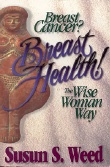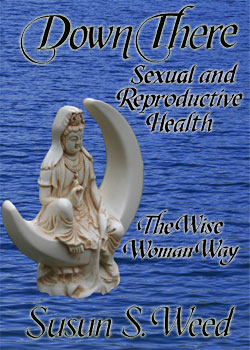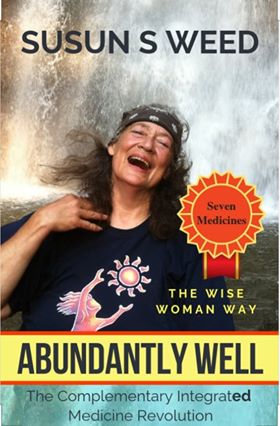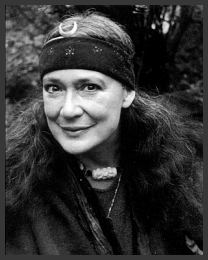FIVE EASY THINGS YOU CAN DO NOW TO
HELP PREVENT BREAST CANCER~2002, Susun S Weed
(author of Breast Cancer? Breast Health! The Wise Woman Way)October is Breast Cancer Awareness Month. But many women are calling it Breast Health Awareness Month! Rather than focusing on breast cancer, we choose to concentrate on keeping our breasts healthy through wise lifestyle and dietary choices.
The following tips may amaze you, since the actions and foods they suggest run counter to many alternative views of cancer prevention. They are supported with strong research, however - from the lab, with animals, and in long-term human studies. Thus, each of these tips has a solid scientific basis, unlike the assertions made by those intent on selling you their opinions and products.
Embarking on even one of these suggestions will definitely lower your risk of breast cancer. Using them all is even better. And as a special treat, I have added three extras. Look for lots more tips for keeping your breasts healthy in my book Breast Cancer? Breast Health! The Wise Woman Way, recommended by many oncologists and breast health specialists including Dr. Susan Love. And please visit my special breast health website: www.breasthealthbook.com
1. Be more activeEvidence continues to accumulate that a vigorous lifestyle is one of the best ways to cut breast cancer risk. A study of 20,624 Norwegian women found those who exercised or worked out regularly cut their breast cancer risk by 72%. (NEJM, 5/1/1997)
For breast health I walk every day, take a weekly yoga class, and do tai chi twice a week.
2. Eat more unrefined seed foods
All seeds provide phytoestrogens. Women who eat the most phytoestrogenic foods are four times less likely to be diagnosed with breast cancer than those who eat the least. "No study has shown a degree of risk reduction similar to that found for phytoestrogens ..." (Lancet, 10/4/1997)
Whole grains such as wheat, rice, corn, kasha, millet, and quinoa are unrefined seed foods. Beans such as lentils, black beans, pinto beans, lima beans, and chickpeas are unrefined seed foods. Nuts including peanuts, walnuts, almonds, and pecans are unrefined seed foods. And edible seeds such as sesame, sunflower, and pumpkin are unrefined seed foods. Fruits and vegetables that are eaten with their seeds - such as strawberries, blueberries, raspberries, kiwi fruit, summer squash, tomatoes, and cucumbers - count as unrefined seed foods. Even seeds used as seasonings count, such as cumin, coriander, caraway, anise, and dill seeds.
For breast health, I have replaced all refined carbohydrates - including white rice and white/unbleached flour products such as pasta, bread, cookies, crackers, pretzels, bagels, donuts, and cakes - with whole grain products.
3. Eat less vegetable oil; increase animal fat, especially from dairy products
"Diets high in corn oil leave animals especially vulnerable to chemically induced cancers" say researchers. (Science News, 6/24/89; 10/2/99) Frightening as this statement is, it is not true only of corn oil but of all vegetable (or seed) oils including those made from soy, sesame, sunflower, cottonseed, flax, and hemp.
If you are dubious about eating more animal fat and dairy products to reduce breast cancer risk, consider this landmark study reported in the Archives of Internal Medicine (1/12/1998). To determine if food affected breast cancer risk. The diets of 61,000 Swedish women between the ages of 40-76 were followed for four years. The results~ For every 5 grams (about a teaspoonful) of vegetable oil consumed per day, breast cancer risk increased by 70%. In contrast, for each 10 grams of fat from meat and dairy products in the daily diet, breast cancer risk was decreased by 55%.
Another study, begun in the early 1970s, followed 4,000 Finnish women's diets for 25 years. Results recently released found that those who "drank the most milk had only half the breast cancer risk of those who drank the least."
American researchers agree. According to a report in International Journal of Cancer (2001), women who drank milk as children and continued drinking it as adults had half the rate of breast cancer of non-milk drinkers. (Yes, I do buy organic milk, but the studies used regular supermarket milk.)
Why~ Galactose, the primary sugar in milk, slows ovarian production of estradiol, a cancer-promoting hormone. Additionally, milk is rich in CLA (conjugated linoleic acid), a fat known to suppress breast tumors in animals.
For breast health I use yogurt, cheese, milk, butter, and olive oil daily, and eat meat occasionally.
Remember that olive oil is pressed from a fruit, not a seed. Women whose diets are high in olive oil, and who eat meat and dairy products regularly, have the lowest rates of breast cancer in the world. (Journal of the National Cancer Institute, 1/18/1995)
4. Eat less tofu and soy beverage; eat more miso and tamari
While it is true that if you begin eating soy foods as a child and continue throughout puberty the breast tissues you create during your adolescence will be highly resistant to cancer until after menopause. However, if you begin eating unfermented soy (tofu, soy milk, and the like) after puberty, your risk of breast cancer increases. (Science News, 4/24/1999)The active ingredient in soy - isoflavone - when given to breast cancer cells in petri dishes causes them to grow rapidly. (Extracts of dong quai and licorice have a similar effect.)
Miso and tamari - fermented soy foods - are the exceptions. Both are strongly cancer preventative, no matter when you start eating them. Animal studies have found both miso and tamari highly effective in preventing cancer, even in mice genetically programmed to get breast cancer. And the more you eat, the more you lower your risk of cancer.
For breast health, I use miso and/or tamari every day. I occasionally eat tofu or edemame. I drink no soy milk, and eat no other soy products of any kind.
5. Eat foods rich in antioxidants; avoid supplements of vitamins C and E
A diet that contains plenty of foods rich in antioxidants definitely lowers breast cancer risk. But supplements seem to do the opposite.
Doctors in Stockholm observed that, among breast cancer patients, treatment failures were higher for women taking vitamin E supplements - and the failure rate increased with dose. Studying this effect, researchers found that the anti-cancer benefits of fish oils "disappeared when [we] gave ... antioxidant vitamins”. In fact, when mice with breast cancer were given vitamin E supplements "the more we gave them, the bigger their tumors grew." The authors conclude that vitamin E supplements "preferentially protect a cancer and even aid its spread." (Science News, 4/29/1995 and 7/15/1995)
Supplements of vitamin C (synthetic ascorbic acid) are poorly used by body tissues. But cancer cells seem to thrive on it. (Cancer Research, 9/15/1999) One new "chemotherapy" links a lethal form of zinc to an ascorbic acid molecule; when the cancer eats the ascorbic acid, the zinc is set free to kill the cancer cell.
For breast health I eat 5-7 servings of dark green and bright red/orange foods daily.
Besides being active, choosing a diet high in phytoestrogens, eating one or more servings of dairy products daily, using miso and tamari regularly, and avoiding vitamin supplements, here are three more things you can do to help prevent breast cancer:
6. Sleep in the dark
Exposure to light at night increases the risk of breast cancer. The Journal of the National Cancer Institute (8/17/2001) reports that chronic suppression of melatonin - an anti-cancer hormone made only in the dark - increases breast cancer risk by at least 36%.
For breast health, be certain there is no light (except from the moon) in the room where you sleep. Not even a night-light. Not the light from a clock. Not the little lights on electronics.
7. Drink red clover blossom infusion
Red clover is a potent anti-cancer herb. It contains ten times more phytoestrogens than soy, and in a more complete form. I have seen it clear in situ cancers and pre-cancerous polyps hundreds of times. Since many breast cancers take 7-10 years to become big enough to be seen on a mammogram, I drink a quart of red clover infusion every week and skip the mammogram.
To prepare the infusion:
~ Place one ounce, by weight (about a cup by volume), of dried red clover in a quart canning jar.
~ Fill the jar to the top with boiling water and lid tightly.
~ Let steep for four hours or overnight.
~ Strain and drink.
~ Refrigerate excess and drink within 24-36 hours.For breast health, I drink red clover infusion regularly.
8. Eat seaweed as a vegetable
If the long-lived and cancer-free Japanese have a secret, it is seaweed, not soy. A sprinkling of kelp as a seasoning is nice, and so are nori rolls - but neither does much to prevent cancer. For that we must eat seaweed as a vegetable - at least a half-cup serving per week. Wakame, kombu, kelp, and alaria are especially effective, but sea palm fronds, hijiki, nori, and dulse may be used on occasion.
There is a rich variety of seaweeds available in Chinese grocery stores, health food stores, and by mail. Seaweed recipes are available in many books (including my herbal Healing Wise).
These eight tips - five easy ones and three more difficult ones - will vastly increase your chances of living to be a wild, wise old woman with healthy breasts. That's the Wise Woman Way the world round.
For permission to reprint this article, contact us at: www.ashtreepublishing.com/contactVisit Susun Weed at: www.susunweed.com and www.wisewomanbookshop.com
Breast Cancer? Breast Health!
The Wise Woman Way
by Susun S. Weed
Foreword by Christiane Northrup, MD
380 pages, index, profusely illustrated.
Foods, exercises, and attitudes to keep your breasts healthy. Supportive complimentary medicines to ease side-effects of surgery, radiation, chemotherapy, or tamoxifen.
Read some excerpts:
Mammograms - Who Needs Them? from Breast Cancer? Breast Health!
Using Herbs Safely from Breast Cancer? Breast Health!
My Anti-Cancer Lifestyle from Breast Cancer? Breast Health!
Order BREAST CANCER? BREAST HEALTH! in our BookshopWhat a gift to women of all ages! This book helped me overcome my fear of what I might discover during self-examination. I am so grateful that this book came my way and I am healthier in mind, body, and spirit thanks to Ms. Weed's wise words! If I could, I would give a copy of this book to every woman in the world!
Wise Woman Herbal for the Childbearing Year
Author: Susun S. Weed.
Simple, safe remedies for pregnancy, childbirth, lactation, and newborns. Includes herbs for fertility and birth control. Foreword by Jeannine Parvati Baker. 196 pages, index, illustrations.
Order at: www.wisewomanbookshop.com
Healing Wise
Author: Susun S. Weed.
Superb herbal in the feminine-intuitive mode. Complete instructions for using common plants for food, beauty, medicine, and longevity. Introduction by Jean Houston. 312 pages, index, illustrations.
Order at: www.wisewomanbookshop.com

NEW Menopausal Years the Wise Woman Way
Author: Susun S. Weed.
The best book on menopause is now better. Completely revised with 100 new pages. All the remedies women know and trust plus hundreds of new ones. New sections on thyroid health, fibromyalgia, hairy problems, male menopause, and herbs for women taking hormones. Recommended by Susan Love MD and Christiane Northrup MD. Introduction by Juliette de Bairacli Levy. 304 pages, index, illustrations.
Order at: www.wisewomanbookshop.com
For excerpts visit: www.menopause-metamorphosis.com
Breast Cancer? Breast Health!
Author: Susun S. Weed.
Foods, exercises, and attitudes to keep your breasts healthy. Supportive complimentary medicines to ease side-effects of surgery, radiation, chemotherapy, or tamoxifen. Foreword by Christiane Northrup, M.D. 380 pages, index, illustrations.
Order at: www.wisewomanbookshop.com
Down There: Sexual and Reproductive Health the Wise Woman Way
Publication date: June 21, 2011
Author: Susun S. Weed
Simple, successful, strategies cover the entire range of options -- from mainstream to radical -- to help you choose the best, and the safest, ways to optimize sexual and reproductive health. Foreword: Aviva Romm, MD, midwife, 484 pages, Index, illustrations.
Order at: www.wisewomanbookshop.com
Abundantly Well - Seven Medicines The Complementary Integrated Medical Revolution
Publication date: December 2019
Author: Susun S. Weed
Seven Medicines build foundational health and guide you to the best health care when problems arise. Includes case studies, recipes, exentsive references and resources. Introduction by Patch Adams illustrated by Durga Yael Bernhard 352 pages, index, illustrations
Order at: www.wisewomanbookshop.com
For Wholesale orders see our terms letter or contact us at:Ash Tree Publishing PO Box 64 Woodstock, NY 12498 ~
Website: www.wisewomanbookshop.com ~
Susun Weed, green witch and wise woman, is an extraordinary teacher with a joyous spirit, a powerful presence, and an encyclopedic knowledge of herbs and health. She is the voice of the Wise Woman Way, where common weeds, simple ceremony, and compassionate listening support and nourish health/wholeness/holiness. She has opened hearts to the magic and medicine of the green nations for three decades. Ms. Weed's Six herbal medicine books focus on women's health topics including: menopause, childbearing, and breast health. Visit her site www.susunweed.com for information on her workshops, apprenticeships, correspondence courses and more! Venture into the Menopause site www.menopause-metamorphosis.com to learn all about the Menopausal Years the Wise Woman Way.
Join Susuns Mentorship site for personal one on one mentorship! We also invite you to visit our commerce site www.wisewomanbookshop.com to learn about our Wise Woman publications, workshops, correspondence courses. As well as online courses at Wise Woman School.
back to articles index
back to press kit
© Susun Weed -Wise Woman Center
~ Disclaimer & Privacy Policy ~






